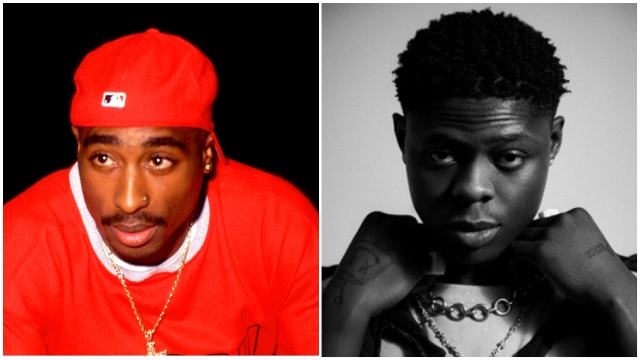Olusegun Adeniyi
Last Friday in Las Vegas, United States, Duane Keith Davis, popularly known as ‘Keffe D,’ was arrested after a grand jury indictment for murder with use of a deadly weapon. Although Davis was brought to court yesterday, his arraignment was deferred till 19 October while he remains in custody. He will be tried for allegedly killing Tupac Shakur, the legendary American rapper, on 13 September 1996 at age 25. It is remarkable that attempts to resolve the fatal shooting of Tupac 27 years ago is coming at a time the Nigerian police have opened an investigation into circumstances surrounding the death of a 27-year-old rapper, professionally known as Mohbad (real name, Ilerioluwa Oladimeji Aloba). He died on 12 September and was buried the next day. A week later, his body was exhumed following a social media campaign.
Let me be upfront here. Ordinarily, I consider myself a music illiterate because I have never even heard of many Nigerian artistes being raved about. And it would be insane to compare a global icon like Tupac with Mohbad whose name and music came to my awareness only after his death. I am not trying to do that. Such is the impact of Tupac on popular culture that there are monuments of him in several countries around the world. Even on the streets of Abuja, you see his image on public vehicles and tricycles. Tupac has also been a subject of intellectual curiosity in several institutions of learning. A year after his death, the University of California, Berkeley offered a course titled, ‘Poetry and History of Tupac.’ And in April 2003, Harvard University co-sponsored the symposium, ‘All Eyez on Me: Tupac Shakur and the Search for the Modern Folk Hero.’ He is adored even by politicians. In 2020, United States Vice President Kamala Harris, then a California Senator, described Shakur as the ‘best rapper alive’, and she justified her curious assertion by saying rather affectionately, ‘West Coast girls think 2Pac lives on’.
However, if we are to learn lessons that will serve the budding rap music in Nigeria, there are parallels to be drawn from Tupac’s life and death and that of Mohbad. This is particularly important for us, with many of our young people believing that their only way to success is through the music/entertainment industry. As an aside, I have encountered many of them in recent years who, believing I ‘know people’, sought my help. I have directed quite a few to those I believe may know how to reach Don Jazzy. I am still on the lookout to see if anyone of these young men will ‘blow’ so that I can remind them of my role in their stardom.
Meanwhile, with an autopsy already conducted on Mohbad’s exhumed remains, the coroner inquest into the cause of death has also started with a hearing fixed for next Wednesday. As stated earlier, I heard the name of Mohbad for the first time after his death. But out of curiosity, I have in recent days listened to some of his songs. There can be no doubt about his talent. The controversy now is about his last days. Before his death, Mohbad had posted social media accusations of being harassed, bullied, and even battered against certain people in the industry. Some have been arrested by the police and we should allow them to do their job.
However, while we await the autopsy report and the coroner inquest, stakeholders in the music industry should not waste this moment. Even if it turns out that Mohbad died of natural causes, glorification of the gangster ethos, debauchery and lawlessness being promoted in the name of music by some with whom he associated is dangerous to the health of our society. The notion that rap music or hip-hop as many call it, is a subculture that only thrives by promoting violence, drugs, sex, and wealth without work, has been disproved even in the United States by Jay-Z, Kanye West, P. Diddy and others who are now corporate giants and strong political voices by virtue of their craft and the choices they made. Sadly, the emerging rap culture in Nigeria tends to glamourise ‘the thug life’ while creating the illusion that success has nothing to do with work. They encourage ‘Yahoo Yahoo’, money rituals and drug dealings.
In June 2009, Reuben Abati wrote a controversial piece on ‘Youth Culture: A Nation’s Identity Crisis’, with special emphasis on the then emerging brand of music in the country and their promoters. In dismissing most of their outputs as noise, Abati compared them to older generations of artistes who “sang music under its real names, not abbreviations or slangs…after the fashion of T.S. Eliot‘s description of ‘Tradition and the Individual Talent’, a pattern of meaning that dates back to traditional African musicians and all the musicians that succeeded them.”
Abati’s anger was driven by what he described as sound with very little sense, shape and skills coming from many of the music stars. He also noted a lack of originality in their lifestyles and comportment. “They try to imitate Western hip pop stars. They even dress like them. The boys don’t wear trousers on their waists: the new thing is called ‘sagging’, somewhere below the waist it looks as if the trouser is about to fall off. The women are struggling to expose strategic flesh as Janet Jackson once did.” But as critical as he was, Abati also recognised the fact that “it is now possible to hold a party without playing a single foreign musical track, the great grandchildren of Nigerian music are belting out purely danceable sounds which excites the young at heart. But the output belongs majorly to the age of meaninglessness and prurience. The lyrics says it all…”
Even if one may argue that some of his statements in the piece were too sweeping (and Banky W. wrote a powerful rejoinder), Reuben made a strong point about the lyrics. And he referenced many of them. Nobody should say that these lyrics don’t matter because they do. In April 1992, an American Trooper, Bill Davidson, was killed by a 19-year-old Ronald Ray Howard. Davidson had stopped the vehicle of Howard for broken headlights, but he shot the cop in the neck before driving off. Three days later, Davidson died of his injuries. In court, Howard claimed that when pulled over by the trooper, he was listening to Tupac’s track, ‘Souljah’s Story’ and the lyrics influenced his decision. Part of the lyrics is about the harsh life of a young black American, especially when he confronts police on the road: “Only fifteen and got problems; Cops on my tail, so I bail ’til I dodge ’em; They finally pull me over and I laugh; ‘Remember Rodney King?’ And I blast on his punk ass…”
In addition to the murder charge against Howard who was eventually convicted and executed by lethal injection in 2005, the officer’s widow, Linda Davidson, filed a separate civil suit against Shakur (who was alive at the time) and his Interscope Records label, a Time Warner subsidiary. In the charge, it was alleged that the label and the rapper were grossly negligent in manufacturing and distributing music that incites “imminent lawless action.” According to the family’s lawyer, the lyrics of the album read like “pages out of a cop-killing manual.” The then United States Vice President Dan Quayle waded in by saying, “There’s no reason for a record like this to be released. It has no place in our society.”
Hip Hop (Rap) is about rhyme, rhythm, and poetry and very popular among young people. Most writers have traced its origin to the early seventies in the United States and the defiance by young African Americans against racism and unequal opportunities. In the process, some took to music as a way of escape by rapping about guns and ghettos as a reflection of their daily living. “Not only did rap provide an outlet to voice the struggles of the black youth”, according to one writer, “it also gave them a sense of pride.” The genre, he concluded, “was a testament to triumphing over hardships, to having enough confidence in oneself not to let the world drag you down, and to rising above the struggle, even when things seem hopeless.”
Our circumstances may be different but there is a way in which rap music is also popular among the deprived of our society. That probably was how Mohbad emerged. Was he exploited by people he trusted? And was his death a result of brutalities inflicted on him? Those are questions authorities will now have to answer. But when the inquest into the circumstances under which he died is over and justice is seen to have been done, I hope two things will happen. One, there should be an attempt to honour him in a way that will benefit his son and wife who are his immediate next of kin. Two, I hope that those who are promoting misogyny, violence, drugs, and other vices in the name of music will retrace their steps.
Fortunately, there is no better place to look than the United States where this genre of music originated. The Big Boys have moved from the streets and dark alleys to the boardroom! And so have their songs. How did Kanye West put it in his album, ‘homecoming’? Yeah, “Reach for the Stars, so if you fall you land on the clouds.” That’s far different from those whose world still revolves around “Cannabis in the rizla, so high I can’t get higher”, while asking young people who look up to them to ‘marry Juana’ and ‘smoke the fire’.
May the soul of Mohbad rest in peace.
Atiku and The Chicago Papers
Ever since former Vice President Atiku Abubakar filed his application at the Northern District of Illinois Court, requesting for an order of mandamus compelling the Chicago State University (CSU) to release information regarding President Bola Tinubu’s school record, I have taken considerable interest in the matter. Complying with the court order on Monday, the school authorities released the documents to Atiku and on Tuesday, their registrar testified under oath. Given the politics involved, supporters of both Tinubu and Atiku are now claiming victory. But since the American deposition is supposed to be part of the election petition case being pursued in Nigeria by the latter, we must wait to see how it all ends.
The Tinubu saga is a long-running one that began 24 years ago in his first year as Governor of Lagos State. Following his victory at the All Progressives Congress (APC) presidential primaries in July last year, I wrote a column on ‘Tinubu’s School Record and Matters Arising’ where I traced how it started, dating back to 1999 based on the information contained in his Independent National Electoral Commission (INEC) form. That Atiku would wait till 2 August this year, two months after Tinubu had been sworn in as president, before commencing his legal inquiry in the United States is what I still don’t understand. How does that help his cause? Since this is a case I have followed from the beginning, readers may refresh their memory with my July 2022 column, https://www.thisdaylive.com/index.php/2022/07/07/tinubus-school-record-and-matters-arising/































































